Reviews
Wet Dreams (Episode 12)
Nicholas Ray
USA, 1974
Credits
Review by Cullen Gallagher
Posted on 07 September 2008
Source Bootleg VHS
Categories The Mystic: The Films of Nicholas Ray
The Janitor is at once the result of a few days of furious filmmaking, working through the night, and inspired improvisation, and the accumulation of a lifetime of preoccupations, neuroses, and anxieties. Like his previous film, We Can’t Go Home Again, The Janitor continues to push the divide between the new and old “Nicholas Ray”—the revolutionary experimenter and the Hollywood auteur. But whereas We Can’t Go Home Again expressed Ray’s reluctant optimism—his hope for a younger generation—The Janitor is decidedly misanthropic. Filled with self-doubt and pervasive skepticism, Ray is devoid of any idealism: all that remains is destruction. In We Can’t Go Home Again, Ray disassembled the image into independent fragments and, like with a puzzle, tried to put them back together again using multiple, simultaneous projections. In The Janitor, Ray literally shoots the screen with a rifle: the film’s final image is of a movie screen engulfed in an all-consuming flame. This is Ray’s revolution, and the movies are under attack. But whose movies are they? The easy answer would be “Hollywood’s,” but perhaps Ray is also taking aim at himself, as well.
Filmed as part of a soft-core porn anthology called Wet Dreams (Dusan Makavejev also contributed a short under the pseudonym of Sam Rotterdam), the story of The Janitor is one of doppelgangers: Ray plays both a Priest with amorous desires for his daughter and the Janitor of a movie studio who watches on with agitation. When the priest lectures a group of youths about the errors of Moses, an orgy erupts out of their religious ecstasy, and when his daughter makes sexual advances towards him—the Priest accepts. Downstairs, the Janitor is spurred to action: grabbing a rifle, he rushes towards a large projected image of the priest and shoots. He is, essentially, killing himself (recalling the suicide at the end of We Can’t Go Home Again). Such a literal explanation of the plot, however, fails to capture the fervor of the film, which in its brief 14 minutes descends into a gutter of repressed desire, self-disgust, and absolute hysteria. (The film’s delirium only adds to its semi-incoherency: full of cryptic words and imagery, obscure motivations and hidden desires, everything teeters on the brink of psychedelia.) All of this is better conveyed in a brief biography of Ray written by David Thomson, in which The Janitor only gets its usual brief mention at the bottom of the filmography.
Nick Ray was a hero to many, and he loved the admiration of the young. He was also indulgent, irresponsible, wanton, sentimental, self-destructive. In other words, there are warnings in his life for the hero-worship of movie directors.1
Watching The Janitor, it is as if Ray himself were well aware of these tendencies and was in some way punishing himself for his behavior. His performance as the Priest reminds equally of exorcism and masochism, as though the act of film was in someway an attempt at reconciling some personal demons. Bernard Eisenschitz suggests that “it is a personal film from the word go… The film is shot almost entirely in close-ups, giving an astonishing sense of brooding re-examination, or mirror effect.”2 He goes on to cite not only the fact that Ray plays both main characters, but also that the Priest, with his youthful entourage, is highly reminiscent of Ray’s role as a teacher at SUNY Binghamton. The parallel is important in that it provides a direct autobiographical link, a point of entrance in which we can begin to interpret The Janitor as a self-reflexive film.
Consider the respective social positions of Ray’s characters: the Janitor is a fringe character, an outcast living on the margin of society, while the Priest is an idol, of sorts, and at the center of attention. Both of them capture the duality of Ray’s career, having gone from being a Hollywood director and working with the biggest stars to working outside the system, improvising a film in upstate New York with a group of untrained students. But neither Janitor/Priest is ever entirely absent from Ray, and often they are like two-sides of the same coin: even while in Hollywood, Ray was still the outsider, rebelling against the system and subverting its conventions.
But it is Ray’s role as a teacher that is the most important connection to The Janitor. His failure to reach a satisfying level of closure on We Can’t Go Home Again left a bitter mark on Ray’s consciousness, and it is highly noticeable in the Priest’s sermon. As he begins to renounce Moses’ commandment “Thou shalt not commit adultery,” the students break out into an orgy. The Priest’s fevered expression suddenly turns confused, as though he is unsure of what he brought about. And then his daughter offers to satisfy him sexually: the immediate satiated expression on his face belies his inner sense of guilt and betrayal. And while Eisenschitz maintains that The Janitor is “one of the few Ray films born, not of torment, but of an openly admitted pleasure,”3 I can’t help but read the film as Ray’s personal purgatory. Haunted by the perceived failure of his previous film, it appears as though Ray feels like he betrayed not only himself, but also his students. He has, like the Priest, led them astray.
Self-doubt saturates every scene, and the only chance of redemption seems to be through the Janitor, who gallops around the empty studio with a broom between his legs as though it were a horse. Lost in his own fantasy world, he is utterly alone. When he looks around, he is disturbed by what he sees: the Priest and his savage lust and wayward thoughts. The spontaneity and steadfastness of the Janitor’s actions suggest that perhaps he, too, shares in the desires of the Priest—are they not two parts of the same person?
There is certainly something apocalyptic in the final image of the screen in flames, as though there is no option left except to obliterate everything and start all over. This remains the sole moment of idealism in the film: Ray’s only hope is to begin again. Ray’s willingness to reject his past and reinvent himself and his films so late in his life and career is both astounding and inspiring, and utterly unique. Few established Hollywood directors have fled the center for the margin so totally as Ray; in leaving behind the industry he not only jettisoned the necessity of compromise, but also the financial and technical support that would have been beneficial in the production of We Can’t Go Home Again and The Janitor. If both films suffer from a lack of technical polish and half-baked ideas, they also retain the power to excite through their punk D.I.Y. aesthetics, which help to elevate the films beyond being mere curiosities. Ultimately, it is Ray’s vigor for pushing the boundaries of both himself and cinema (a characteristic that runs throughout his career) that makes The Janitor a compelling, if challenging, viewing experience.
More The Mystic: The Films of Nicholas Ray
-
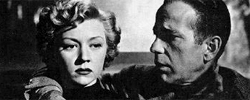
In A Lonely Place
1950 -

They Live By Night
1948 -
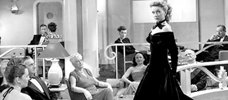
A Woman’s Secret
1949 -
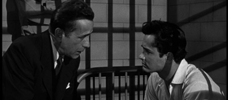
Knock on Any Door
1949 -

Born to Be Bad
1950 -
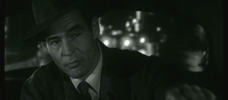
On Dangerous Ground
1952 -
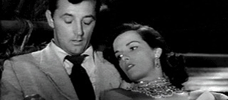
Macao
1952 -
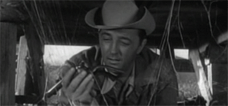
The Lusty Men
1952 -

Johnny Guitar
1954 -

High Green Wall
1954 -

Rebel Without a Cause
1955 -

Bigger Than Life
1956 -

Hot Blood
1956 -

The True Story of Jesse James
1957 -
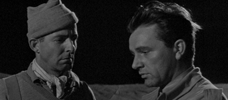
Bitter Victory
1957 -

Party Girl
1958 -

King of Kings
1961 -

55 Days at Peking
1963 -

The Janitor
1974 -

We Can’t Go Home Again
1973-1976 -
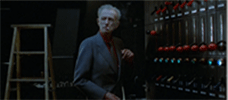
Lightning Over Water
1980
We don’t do comments anymore, but you may contact us here or find us on Twitter or Facebook.



